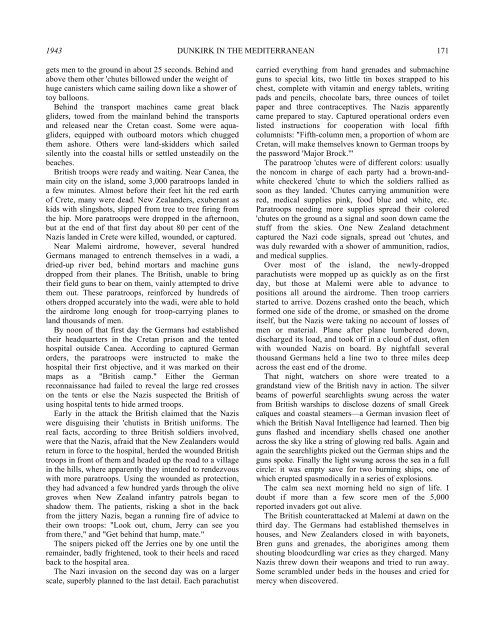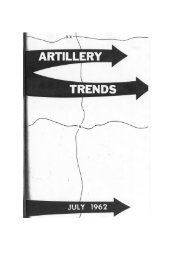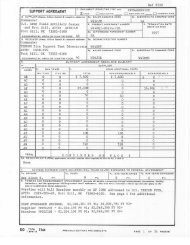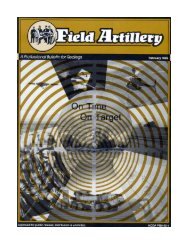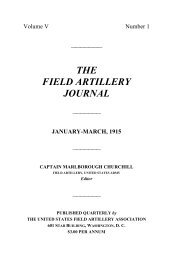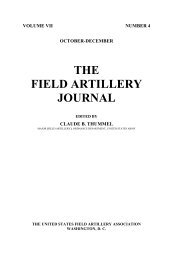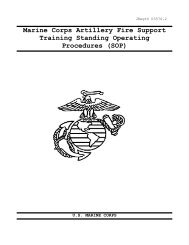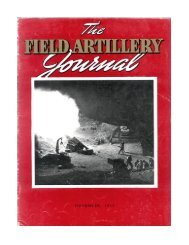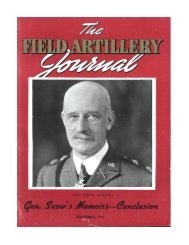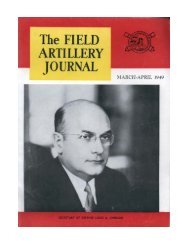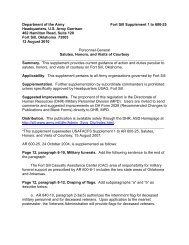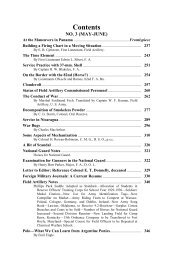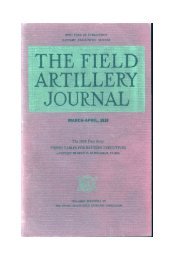the field artillery journal - Fort Sill - U.S. Army
the field artillery journal - Fort Sill - U.S. Army
the field artillery journal - Fort Sill - U.S. Army
Create successful ePaper yourself
Turn your PDF publications into a flip-book with our unique Google optimized e-Paper software.
1943 DUNKIRK IN THE MEDITERRANEAN 171<br />
gets men to <strong>the</strong> ground in about 25 seconds. Behind and<br />
above <strong>the</strong>m o<strong>the</strong>r 'chutes billowed under <strong>the</strong> weight of<br />
huge canisters which came sailing down like a shower of<br />
toy balloons.<br />
Behind <strong>the</strong> transport machines came great black<br />
gliders, towed from <strong>the</strong> mainland behind <strong>the</strong> transports<br />
and released near <strong>the</strong> Cretan coast. Some were aquagliders,<br />
equipped with outboard motors which chugged<br />
<strong>the</strong>m ashore. O<strong>the</strong>rs were land-skidders which sailed<br />
silently into <strong>the</strong> coastal hills or settled unsteadily on <strong>the</strong><br />
beaches.<br />
British troops were ready and waiting. Near Canea, <strong>the</strong><br />
main city on <strong>the</strong> island, some 3,000 paratroops landed in<br />
a few minutes. Almost before <strong>the</strong>ir feet hit <strong>the</strong> red earth<br />
of Crete, many were dead. New Zealanders, exuberant as<br />
kids with slingshots, slipped from tree to tree firing from<br />
<strong>the</strong> hip. More paratroops were dropped in <strong>the</strong> afternoon,<br />
but at <strong>the</strong> end of that first day about 80 per cent of <strong>the</strong><br />
Nazis landed in Crete were killed, wounded, or captured.<br />
Near Malemi airdrome, however, several hundred<br />
Germans managed to entrench <strong>the</strong>mselves in a wadi, a<br />
dried-up river bed, behind mortars and machine guns<br />
dropped from <strong>the</strong>ir planes. The British, unable to bring<br />
<strong>the</strong>ir <strong>field</strong> guns to bear on <strong>the</strong>m, vainly attempted to drive<br />
<strong>the</strong>m out. These paratroops, reinforced by hundreds of<br />
o<strong>the</strong>rs dropped accurately into <strong>the</strong> wadi, were able to hold<br />
<strong>the</strong> airdrome long enough for troop-carrying planes to<br />
land thousands of men.<br />
By noon of that first day <strong>the</strong> Germans had established<br />
<strong>the</strong>ir headquarters in <strong>the</strong> Cretan prison and <strong>the</strong> tented<br />
hospital outside Canea. According to captured German<br />
orders, <strong>the</strong> paratroops were instructed to make <strong>the</strong><br />
hospital <strong>the</strong>ir first objective, and it was marked on <strong>the</strong>ir<br />
maps as a "British camp." Ei<strong>the</strong>r <strong>the</strong> German<br />
reconnaissance had failed to reveal <strong>the</strong> large red crosses<br />
on <strong>the</strong> tents or else <strong>the</strong> Nazis suspected <strong>the</strong> British of<br />
using hospital tents to hide armed troops.<br />
Early in <strong>the</strong> attack <strong>the</strong> British claimed that <strong>the</strong> Nazis<br />
were disguising <strong>the</strong>ir 'chutists in British uniforms. The<br />
real facts, according to three British soldiers involved,<br />
were that <strong>the</strong> Nazis, afraid that <strong>the</strong> New Zealanders would<br />
return in force to <strong>the</strong> hospital, herded <strong>the</strong> wounded British<br />
troops in front of <strong>the</strong>m and headed up <strong>the</strong> road to a village<br />
in <strong>the</strong> hills, where apparently <strong>the</strong>y intended to rendezvous<br />
with more paratroops. Using <strong>the</strong> wounded as protection,<br />
<strong>the</strong>y had advanced a few hundred yards through <strong>the</strong> olive<br />
groves when New Zealand infantry patrols began to<br />
shadow <strong>the</strong>m. The patients, risking a shot in <strong>the</strong> back<br />
from <strong>the</strong> jittery Nazis, began a running fire of advice to<br />
<strong>the</strong>ir own troops: "Look out, chum, Jerry can see you<br />
from <strong>the</strong>re," and "Get behind that hump, mate."<br />
The snipers picked off <strong>the</strong> Jerries one by one until <strong>the</strong><br />
remainder, badly frightened, took to <strong>the</strong>ir heels and raced<br />
back to <strong>the</strong> hospital area.<br />
The Nazi invasion on <strong>the</strong> second day was on a larger<br />
scale, superbly planned to <strong>the</strong> last detail. Each parachutist<br />
carried everything from hand grenades and submachine<br />
guns to special kits, two little tin boxes strapped to his<br />
chest, complete with vitamin and energy tablets, writing<br />
pads and pencils, chocolate bars, three ounces of toilet<br />
paper and three contraceptives. The Nazis apparently<br />
came prepared to stay. Captured operational orders even<br />
listed instructions for cooperation with local fifth<br />
columnists: "Fifth-column men, a proportion of whom are<br />
Cretan, will make <strong>the</strong>mselves known to German troops by<br />
<strong>the</strong> password 'Major Brock.'"<br />
The paratroop 'chutes were of different colors: usually<br />
<strong>the</strong> noncom in charge of each party had a brown-andwhite<br />
checkered 'chute to which <strong>the</strong> soldiers rallied as<br />
soon as <strong>the</strong>y landed. 'Chutes carrying ammunition were<br />
red, medical supplies pink, food blue and white, etc.<br />
Paratroops needing more supplies spread <strong>the</strong>ir colored<br />
'chutes on <strong>the</strong> ground as a signal and soon down came <strong>the</strong><br />
stuff from <strong>the</strong> skies. One New Zealand detachment<br />
captured <strong>the</strong> Nazi code signals, spread out 'chutes, and<br />
was duly rewarded with a shower of ammunition, radios,<br />
and medical supplies.<br />
Over most of <strong>the</strong> island, <strong>the</strong> newly-dropped<br />
parachutists were mopped up as quickly as on <strong>the</strong> first<br />
day, but those at Malemi were able to advance to<br />
positions all around <strong>the</strong> airdrome. Then troop carriers<br />
started to arrive. Dozens crashed onto <strong>the</strong> beach, which<br />
formed one side of <strong>the</strong> drome, or smashed on <strong>the</strong> drome<br />
itself, but <strong>the</strong> Nazis were taking no account of losses of<br />
men or material. Plane after plane lumbered down,<br />
discharged its load, and took off in a cloud of dust, often<br />
with wounded Nazis on board. By nightfall several<br />
thousand Germans held a line two to three miles deep<br />
across <strong>the</strong> east end of <strong>the</strong> drome.<br />
That night, watchers on shore were treated to a<br />
grandstand view of <strong>the</strong> British navy in action. The silver<br />
beams of powerful searchlights swung across <strong>the</strong> water<br />
from British warships to disclose dozens of small Greek<br />
caïques and coastal steamers—a German invasion fleet of<br />
which <strong>the</strong> British Naval Intelligence had learned. Then big<br />
guns flashed and incendiary shells chased one ano<strong>the</strong>r<br />
across <strong>the</strong> sky like a string of glowing red balls. Again and<br />
again <strong>the</strong> searchlights picked out <strong>the</strong> German ships and <strong>the</strong><br />
guns spoke. Finally <strong>the</strong> light swung across <strong>the</strong> sea in a full<br />
circle: it was empty save for two burning ships, one of<br />
which erupted spasmodically in a series of explosions.<br />
The calm sea next morning held no sign of life. I<br />
doubt if more than a few score men of <strong>the</strong> 5,000<br />
reported invaders got out alive.<br />
The British counterattacked at Malemi at dawn on <strong>the</strong><br />
third day. The Germans had established <strong>the</strong>mselves in<br />
houses, and New Zealanders closed in with bayonets,<br />
Bren guns and grenades, <strong>the</strong> aborigines among <strong>the</strong>m<br />
shouting bloodcurdling war cries as <strong>the</strong>y charged. Many<br />
Nazis threw down <strong>the</strong>ir weapons and tried to run away.<br />
Some scrambled under beds in <strong>the</strong> houses and cried for<br />
mercy when discovered.


